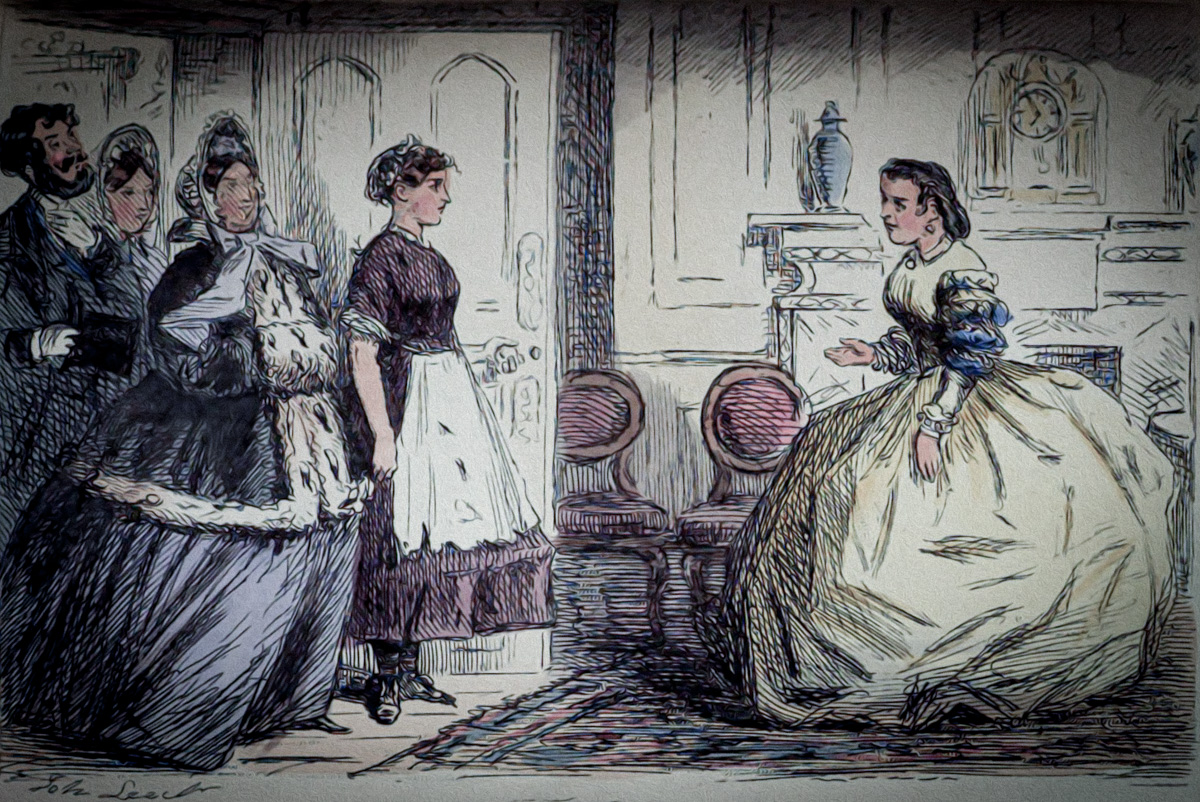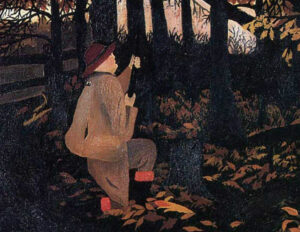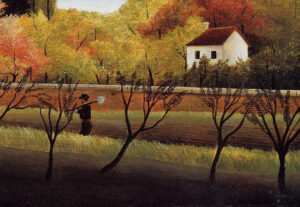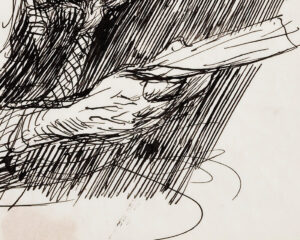The Unexpected Visitor
Reclaiming Our Lost Culture of Calling

Mrs. Carmel Richardson
It takes time to make a place a home. When I found myself unpacking our house in a new town last fall, I was prepared to do some work. What I was not prepared for was the new acquaintance who walked up onto our front porch, uninvited and unannounced, and called on me.
We had moved from one of America’s largest cities to a small, rural town, so maybe it was just the culture shock of her neighborliness; still, it struck me that, though we’d only met twice, she had the confidence to knock on the glass storm door at nine o’clock on a Monday morning. It was County Fair Week, and she and her kids were walking to see the opening day festivities. She invited us to join.
Perhaps greater than the delight of being called upon — what could make one feel more welcome? — was the realization that this new acquaintance had done precisely what my husband and a few friends of ours had only talked about wanting to do. We had been plotting to knock on friends’ doors without warning, and hoped, indeed anticipated, to be answered with a smile. This “calling culture,” as we referred to it, is something of a bete noir in modern America. We can’t even call one another by phone without scheduling a date and time in advance. But it was not so foreign to our ancestors, nor is it even now to folks in cultures other than our own. My husband and I planned to try it, in hopes we could loosen the grip on privacy — our own and others’ — that our generation and our national heritage incline us to. And here this woman had already beaten us to the task.
 Her boldness was as delightful for its own sake as it was for its spontaneity. This was something that had attracted us to calling in the first place: The joy of seeing an expected friend cannot be matched with the joy of a surprise visit, not least because it is automatically casual. Others have already praised the front porch for this reason. A third space between my house and yours, it is an unfussy place for strangers to become acquaintances; acquaintances, friends; and friends, kindred. The act of smoking with someone is too, I am told. Whereas arranging a time to meet feels like an interview, or a date, in which the back-and-forth of choosing a time and place makes us stiff, sharing a smoke or stopping by the porch feels perfectly accidental. Like porches and pipes, paying calls can be both nonchalant — I just happened to be in your neighborhood and thought I’d drop by — and delightfully intimate in the same breath. Unlike a stoop or a smoke, you don’t have to stay out in the cold when visiting. The stranger is welcomed in.
Her boldness was as delightful for its own sake as it was for its spontaneity. This was something that had attracted us to calling in the first place: The joy of seeing an expected friend cannot be matched with the joy of a surprise visit, not least because it is automatically casual. Others have already praised the front porch for this reason. A third space between my house and yours, it is an unfussy place for strangers to become acquaintances; acquaintances, friends; and friends, kindred. The act of smoking with someone is too, I am told. Whereas arranging a time to meet feels like an interview, or a date, in which the back-and-forth of choosing a time and place makes us stiff, sharing a smoke or stopping by the porch feels perfectly accidental. Like porches and pipes, paying calls can be both nonchalant — I just happened to be in your neighborhood and thought I’d drop by — and delightfully intimate in the same breath. Unlike a stoop or a smoke, you don’t have to stay out in the cold when visiting. The stranger is welcomed in.
At the first two doors my husband and I knocked, the door was not opened. It was cold and getting dark, and the baby in the stroller was beginning to protest. Still, rather than feel discouraged, our failed attempts emboldened us to try a third. This will be the one, we told each other. Sure enough, within moments of tapping, we were brought into the warmth of this third friend’s living room, and laughing together not long after that. A few weeks later, those friends returned the favor to us, and even wound up staying for dinner. That same week, when I brought a sweet treat to another friend, I intended to cheer her as she returned to work after maternity leave. I do not know whether I did, but tramping down her snowy steps on my way home, refreshed by our brief conversation, my own spirits were lifted.
The intimacy of entering a new acquaintance’s home is intimidating, but this should not stop us. There is certain relief for both parties when the visitor boldly crosses the threshold, rather than hesitating to close the gap. It is a gesture that says “I would love to,” rather than merely “That would be fine.” Once inside, the visitor immediately begins to learn about his host in a way no other setting permits: The muddy boots in the corner suggest the host is of an adventurous sort, as does the camping chair he’s repairing at the kitchen table; the page the magazine is flipped to, or the sheet music at the piano, say something of his interests, and therefore easy topics of conversation. It is significantly harder to find yourself in a conversation about a book your friend read years ago when there is not a little shelf of books your friend read years ago on offer for you to peruse. These are the little buttery layers that smooth social interaction between human beings (an inherently lumpy thing) and form the beginnings of a well-seasoned friendship.
These are the little buttery layers that smooth social interaction between human beings (an inherently lumpy thing) and form the beginnings of a well-seasoned friendship.
The earliest instance of prescribed calling protocol is seventeenth century France, though surely the practice of making calls, in one form or another, is as old as humanity. It has been captured most vividly in our cultural imagination by Georgian England. How could we ever forget Jane Austen’s Mrs. Bennet, begging her husband to call on the new, unmarried gentleman in the neighborhood? As a social practice, it involved observing certain rules — never come empty handed, for one, even if the article in palm is just the latest piece of gossip — and the use of a calling card, which a visitor would leave with the servant at a friend’s home the way we might leave a business card with a secretary. Most importantly, a return visit should be paid within a few days of your being called upon.
In modern practice, you might choose to stop by when running an errand in your friend’s neighborhood or when taking a walk around town. Your friend likes church history, and it was recently St. Patrick’s Day, so you ask him can he tell you the origins of the holiday? This is your gift, to honor his knowledge and take interest in his interests. Or perhaps you share the fruits of your labor, since these gifts are modest, and do not make the hostess uncomfortable for having prepared nothing in return. I have an abundance of tomatoes in my garden, and thought you might enjoy some and I made a pie last night. Would you and your husband take a slice for the sake of my waistband? are entirely acceptable and low-pressure ways of doing this. (I brought your favorite coffee order and a new book you’ve been wanting is not, as it puts the host at a disadvantage.) While a business card would be gauche, consider finding a subtle way to offer your name, if the friend is so new that he may have forgotten.
Georgian calling rules indicated that a visit should not last more than twenty minutes, preventing oversharers from dominating the evening (or morning, as the custom was), but also no fewer than ten. This meant that even the quiet among us were imposed upon to say something more than “Hello,” “Hope you are well,” and “It’s good to see you.” So, you practice the skill of thinking on your feet, and ask about the plants on the windowsill. It seems your host has a knack for herbs. Maybe he sends you with a bunch before you go on your way.
On the receiving end, a surprise visitor, like my new neighbor at the front door, can catch us fumbling. Is the house presentable enough to host? Are we? For this reason, the Georgian calling rules included calling hours, much like academia’s system of office hours, during which a home would be open to visitors. Our own attempts will require a bit more trial and error, since modern America has no such understood visiting hours, but afternoons are generally a safe bet for stay-at-home mothers, while evenings work well for families and those who work a nine-to-five schedule.
 Telling friends you’ll receive spontaneous visits during a given time frame (2:00 p.m. to 4:00 p.m. on Thursdays, coffee and pastry provided) serves the dual purpose of encouraging their visit and encouraging you to be ready. To do so requires walking the line between a tidiness in your home that makes guests comfortable and one which makes them uncomfortable. Imperfections are endearing, and a bustling household with lots of children should not inhibit its function in order to be neat for the visitor. But neither is industry an excuse for chaos. So we find a balance.
Telling friends you’ll receive spontaneous visits during a given time frame (2:00 p.m. to 4:00 p.m. on Thursdays, coffee and pastry provided) serves the dual purpose of encouraging their visit and encouraging you to be ready. To do so requires walking the line between a tidiness in your home that makes guests comfortable and one which makes them uncomfortable. Imperfections are endearing, and a bustling household with lots of children should not inhibit its function in order to be neat for the visitor. But neither is industry an excuse for chaos. So we find a balance.
The calling system is marvelously efficient: In an hour or two of such visits, all the socializing of a week may be done. But efficiency is not really the point. The real point is to learn the virtue of imposition.
It sounds off to the modern ear. Imposition breaks down the individual privacy we hold so dear, and feels dangerously like making a claim on someone else, a claim we feel we have no right to hold. He works his work, I mine, Tennyson, as Odysseus, wrote of his own son Telemachus. We think the same of our neighbors. We should hate to stumble upon him without prior notice; we can hardly make eye contact with him when we see him at the grocery store. We should be mortified to demand his attention by showing up at his door uninvited.
We should hate to stumble upon him without prior notice; we can hardly make eye contact with him when we see him at the grocery store.
But friendship is born of imposition, and friendship is what we are after. The very idea of it comes from a need that overrides our reflexive individualism and makes a martyr of privacy. Each man’s need for companionship means he must impose on others to fill some lack in himself. This is not a bad thing, it is simply true. If friendship begins when two people say to one another, You too?, as Lewis famously wrote, it is established when they say, Me too. That is, I am human, too. I am not too aloof, too insecure, nor too shy to admit of it. Will you share yourself with me?
Peculiarly, we do not have the same fear of imposition when it comes to interrupting a man’s privacy through the medium of technology. A text message is more socially acceptable than a phone call, and certainly than a surprise visit. We even permit ourselves to expect a response within a certain time frame, just like when paying calls in person. We feel obliged, too, to answer these texts the minute the phone chimes — no matter if we are at the dinner table, in conversation with someone else in person, or even in bed. These little interruptions can become quite taxing, especially since, unlike paying a call, there is not an hour in the day during which we are safe from them.
If imposition is such a good thing, does it matter what form it takes? As it turns out, it matters greatly. The purpose of quotidian interactions is to build to richer, deeper ones. At least in my own experience, making this transition is much harder when the opening moves have all been digital. If anything, frequent online interaction with a person we don’t also shake hands with can increase, not decrease, the difficulty of becoming friends in the flesh, since we have been given extensive knowledge of her life with little or no corresponding tactile connection. It is like the difference between a billboard and a personal thank-you note. In the end, while we have imposed, we have still not found intimacy.
Curing this is precisely the reason to go calling. An in-person visit requires us to give our physical selves, not just our spiritual ones. It is the first step toward meeting one another’s physical needs as friends, too, the necessary precursor to borrowed ladders, shared meals, and hugs.
Perhaps our greatest fear is verified: we are not wanted. Perhaps we are even a burdensome bore. Still, unless our host is intolerably rude, she will not turn away the neighbor at her door. This is true hospitality: not bread broken for the one who is already loved, but a free gift, even for the one who seems least worthy. Our job as the caller is to take it.
Such imposition may be a mercy to the person on whom we impose, too. True, the visitor invites himself into his friend’s house, but he also eliminates the work of pursuit. His actions tell the man, “Here am I, offered at your leisure, in your abode, for as brief or as long as you may like.” The caller gives his gift, but he also gives himself. It is virtuous for the visitor to learn this art; it is good for him to not think too highly of his friend’s time, nor too lowly of himself, to approach the door. To him who asks, he will receive; to him who knocks, the door will be opened.





















